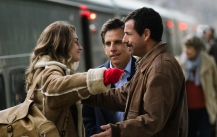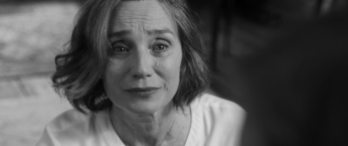30/10/17
Hold the front page! Adam Sandler has made a good film! No, seriously, I’m not making this up. He’s one of the featured performers in Noah Baumbach’s The Meyerowitz Stories (New and Selected) and he’s pretty damned good in it.
Of course, those who know these things will already be aware that, in 2002, he made a film called Punch Drunk Love directed by Paul Thomas Anderson, and he was pretty good in that too. (At a push, I’d even argue that The Wedding Singer is a decent movie.) But even his most avid fans will have to admit that such occurrences are pretty rare and that most of his considerable cinematic output is either to be avoided like the plague or to be viewed in that ‘so bad its good’ ironic sort of way.
Here, Sandler plays Danny, the son of Harold Meyerowitz (Dustin Hoffman), a once acclaimed sculptor who, through a combination of bad luck and bad business decisions, now finds himself coasting on his previous successes, doomed to watch helplessly as other, less talented (at least in his estimation) artists, receive all the adulation that he thinks is his by right. Because of Harold’s single-minded determination to bolster his own ego, Danny has never really enjoyed anything approaching a career (he’s a failed musician), but has pretty much devoted his life to helping his daughter, Eliza (Grace Van Patten), achieve her ambitions to become a film maker.
Danny’s sister, Jean (Elizabeth Marvel), is also terribly unfulfilled, the kind of character who drifts along through life going wherever destiny takes her and it’s clear that she too has suffered because of her father’s emotional distance. Harold is now bumbling through a marriage (his fourth) to the alcoholic Maureen (Emma Thompson), but, when an unexpected illness threatens to carry him off, Danny and Jean’s half-brother, Matthew (Ben Stiller), comes to visit. Matthew is a highly-motivated and very successful businessman, who is trying to sort out his father’s financial straits but, when the three offspring come together for the first time in years, old resentments soon come bubbling to the surface…
This is the kind of territory Baumbach excels at and he has an absolute field day here. The story is told in episodes, each one jumping forward a little in time and there’s a delightful recurring motif of Danny losing his temper and the camera cutting away as if to censor his outbursts. Hoffman is excellent as the highly manipulative Harold and Stiller delivers a nice performance as a man being torn between caring for his father and punching him on the nose. There’s even a delightful cameo from Sigourney Weaver as… well, Sigourney Weaver. If you are expecting to see this at the cinema anytime soon, don’t be misled. This is another Netflix Original, ready for viewing at any time by its customers. However much traditional filmgoers may resent this phenomenon, it’s clear that it’s here to stay. Netflix has recently announced that they will be ramping up their production slate – and, as long as they continue to make quality films like this one, I say good luck to them.
Tune in and check this out – if only for the novelty of seeing an Adam Sandler movie that doesn’t make you reach of the ‘off’ switch.
4.4 stars
Philip Caveney

































